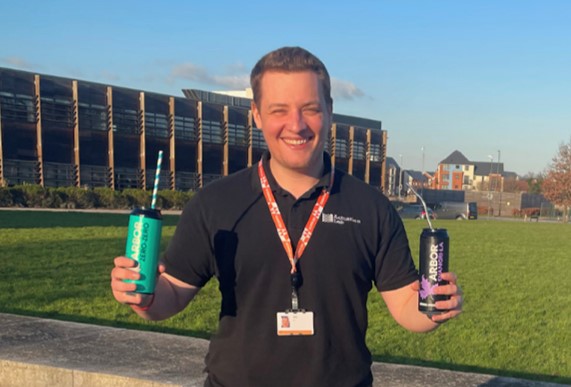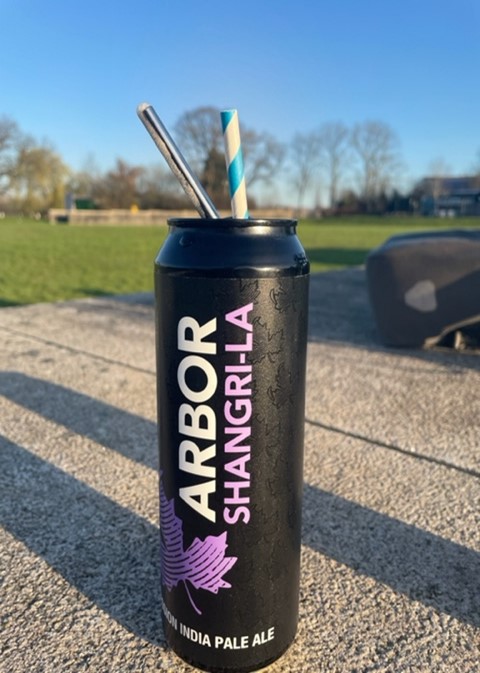Letters from the Lab #002
Plastics are environmentally unpopular. Single-use plastics, such as straws, made from polypropylene, take hundreds of years to decompose and are traditionally synthesised from petrochemical resources derived from fossil fuel production.
About the Author

Sustainable straw wars at the Bristol and Bath Science Park
Matt completed his Master’s in Aerospace Engineering at Sheffield Hallam University in 2020. His final year was dedicated to proving the aerodynamic performance of aerospace structures that were manufactured from sustainable composite materials.
This work developed Matt’s curiosity to review Actuation Lab’s manufacturing practices for sustainability. As an R&D Engineer, Matt leads environmental impact assessments of Actuation Lab’s manufacturing processes in order to drive the creation of products with a significantly lower carbon footprint than our competitors.
Can plastic products ever be good for the environment?
Plastics are environmentally unpopular. Single-use plastics, such as straws, made from polypropylene, take hundreds of years to decompose and are traditionally synthesised from petrochemical resources derived from fossil fuel production. The UK’s dependence on plastic, however, for its low cost and ease of manufacture, prolongs our demand for such dirty fossil fuels and so plastic negatively contributes to climate change a lot longer before polluting our oceans.
The transition from plastic to paper straws that is evident in places like McDonald’s and Costa Coffee serves to remind us of the sheer amount of plastic pollution caused by single-use plastic products. But can plastic products ever be good for the environment? Well, yes, plastics can allow us to manufacture durable industrial hardware, and a greater resilience means less part turnover, and less part turnover = less waste. Reduced part turnover is evident at Actuation Lab, where we are developing a polymer composite actuator (the Callimorph®) designed to last twice as long as metal counterparts that are currently available.
Whilst it might be an easy choice for McDonald’s and Costa Coffee to use paper straws, what if we need our products to last in the harshest environments for many years? Will those plastics that are so resilient be good materials to use, or not?
It is this facet of design, along with key performance characteristics and proposed service conditions, which has been an indispensable consideration for the materials we use at Actuation Lab.

Common straw replacements – metal and paper in an Arbor Shangri-La
Vulcanised rubbers, found in products like car tyres, are extremely resilient, and have been relied upon heavily in the past, but they are irreversibly hardened by heat, and as such are non-recyclable. Thermoplastic elastomers (TPEs), however, are an example of a polymer that has actively replaced vulcanised rubbers to achieve a positive environmental impact. TPEs exhibit elasticity, impact resistance, and flex fatigue, like rubbers, but also on a molecular level, the polymer chain does not degrade when melted down, which makes them fully recyclable and an excellent choice for rapid, iterative design. TPEs, and by extension composites, have increasingly solidified their place as substitutes for metals and rubbers in many high-strength applications, such as aerospace engineering, due to their lightweight nature in addition to their superior durability in harsh environments.
But, whilst it is good to say these materials are more environmentally friendly, how can this be quantified? One way to assess the climate impact of a product is with a Product Carbon Footprint (PCF) assessment. A case study from Actuation Lab compared the equivalent carbon emissions (CO2e) of the Callimorph® versus a typical market equivalent metal actuator. A 73% reduction in equivalent carbon emissions was found between both products, which equates to a difference of 18.3 kWh or 65.7 MJ. This is the same energy as driving an electric car for 61 miles or eating 29 Big Macs!
All this being said, it would be impossible to replace all metal parts with thermoplastics. Modern engineers understand that different design methods are required for metal parts compared to plastic parts and vice versa. For more information on this, I highly recommend reading Letters from the Lab #001!
So, the big question is when should we use plastics in parts? Like many things, it is the inherent financial savings that drive end use. Typical thermoplastic manufacturing processes such as injection moulding eliminate secondary processes, offer faster process cycle times, and also reduce shipping costs due to significant weight reductions. At Actuation Lab, we find ourselves asking the same questions – Do we want the product to last significantly longer than its metal counterpart? Do we want to reduce costs? Do we want a product that can be recycled? Is the product going to operate in a harsh environment? If the answer to all these questions is Yes, we see fit to employ thermoplastic elastomers.
To find out more about just how Actuation Lab are selecting sustainable, advanced materials, be sure to follow us on LinkedIn for updates on the development of our Callimorph® Pneumatic Valve Actuator and other exciting products.









